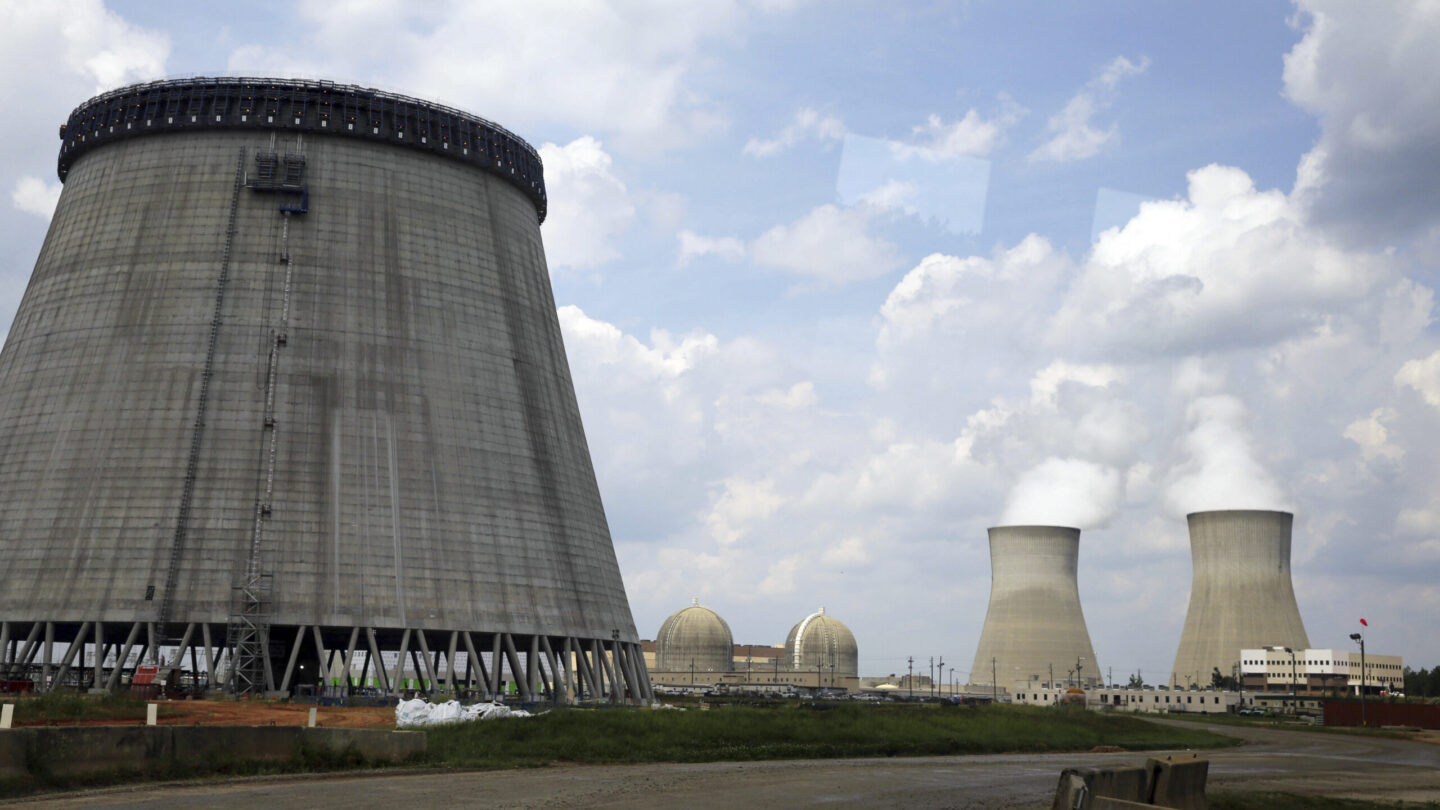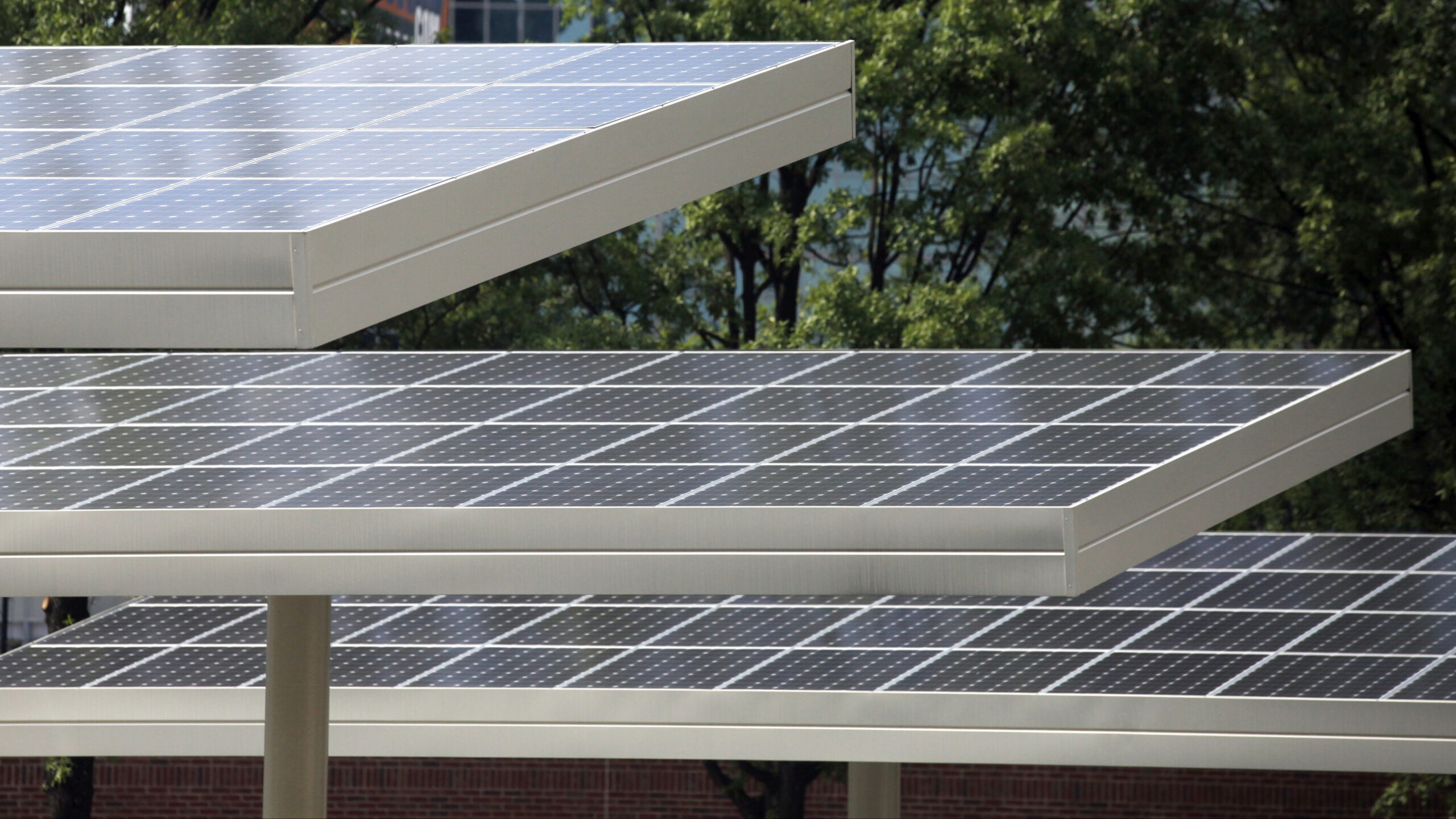Regulators approve more solar, gas energy for Georgia Power

John Bazemore / Associated Press
Georgia’s largest electric utility will add more solar power in the next five years, but will get an equal amount of energy from climate-warming natural gas under a plan approved Thursday by state regulators.
The company will add more battery storage to help boost renewable energy, and will focus more on energy efficiency in the future.
But the Public Service Commission also delayed key decisions on coal plants that Georgia Power wants to close, and on a popular rooftop solar program.
“As Georgia continues to grow and the energy landscape continues to evolve, it’s incredibly important that we keep making the smart investments needed for our customers to have clean, safe, reliable and affordable energy for decades to come,” Georgia Power CEO Chris Womack said in a statement after the commission approved the company’s 2022 Integrated Resource Plan.
But several groups that provided expert testimony and cross-examined witnesses in hearings before the commission questioned the company’s investments and the moves the commission approved. Some said the decisions would not only contribute to climate change but did not make economic sense, either.
“When we talk about what’s really driving customers’ bills up, it’s not clean energy that’s driving customer bills up,” said Jill Kysor, senior attorney with the Southern Environmental Law Center. “It’s over-commitments to capacity that’s above and beyond what we need.”
Kysor and others criticized the utility’s reliance on methane even as it retires coal when other energy sources like solar are cleaner and cheaper. And they criticized the commission’s decision to delay action on some coal units.
A big gas buy
Georgia Power requested, and the commission approved, six power purchase agreements for electricity generated by burning a mix of gas that’s mostly methane
Critics said those contracts added more capacity than the company needs. One of those purchase agreements wouldn’t begin until 2028, so the Southern Alliance for Clean Energy argued it could wait until the following IRP process in 2025. And because the commission delayed action on closing two coal units, several experts agreed that even more of the gas power could have been rejected.
“They don’t need that much gas,” said Isabella Ariza of the Sierra Club. “They don’t need gas at all if they increase solar.”
When combined with battery storage, improved efficiency and other programs, renewables like solar can be cheaper than gas, which has seen prices skyrocket because of the war in Ukraine.
“Coal is un-economic because coal is expensive. Gas prices have been sky high in the last year, and that’s going to cause further upward pressure on people’s bills,” Kysor said. “We have very volatile gas prices and don’t need it in the short term. So it feels like over-committing a risky, risky choice for customers.”
Modest, clean energy gains
Georgia Power will add more solar, about 2,300 MW, which the company initially proposed. In previous cases, the commission has doubled the utility’s initial solar ask, but that didn’t happen this time.
“We were hoping to see some more,” said Ariza. “We submitted expert testimony that showed that doubling was feasible and economical. But for the first time in a few IRP cycles, the commissioners didn’t receive any motions to increase solar. So they just went with what the company asked for.”
But the utility will add more batteries to store solar energy so it can be used even when the sun isn’t shining.
In addition to a 265 MW storage project by Georgia Power, commissioners added 500 MW of storage that will be built through a competitive bid process and operated by Georgia Power. It’s less total storage than the company initially proposed, but the solar industry still celebrated it as a win.
“Georgia took significant steps in expanding renewable energy development across the state,” said Will Giese of the Solar Energy Industries Association in a statement. “The solar and storage additions to Georgia Power’s integrated resource plan will help ease the inflation pinch on Georgia families through the procurement of stable, low-cost clean energy.”
Commissioners also increased Georgia Power’s annual energy efficiency targets by 15 percent. Experts have pushed for more emphasis on energy efficiency because it is cheaper to save energy – meaning the customer needs to buy less – than it is to generate energy and get it to the customer.
For that reason, advocates also applauded an order that in future IRPs, energy efficiency will compete head-to-head with generated electricity.
“This is a critical step to determining the least-cost, least-risky, and most diverse resource mix, and should ultimately lead to increased investment in low-cost energy efficiency,” the Southern Alliance for Clean Energy and Southface Institute wrote in a joint statement.
But the commission put off a decision on perhaps the most closely-watched solar issue: whether to expand a popular solar program known as monthly net metering that makes energy from rooftop solar panels cheaper for people who install them in their homes and businesses.
Georgia Power tried monthly netting in a pilot project marked at 5,000 customers; it was so popular that it filled up in just over a year.
Commissioner Tim Echols introduced a motion Thursday to expand it.
“Continuing this will promote economic development and allow more customers to be a part of this clean energy economy,” Echols said.
Only one other commissioner, Bubba McDonald, supported the move. Instead, the commission voted to consider net metering later this year in the rate case, where they decide what people pay on their energy bills.
The big unknowns
Solar proponents came into the IRP process hoping the commission would expand net metering immediately. Several said they were disappointed the commission put off a decision, but they are hopeful it can happen in the rate case.
Kysor said net metering is only becoming more important as energy bills may go up. In the same upcoming rate case, Georgia Power has proposed a 12 percent increase in customer bills.
“At the end of the day, Georgians are staring down several big electric bill increases,” she said. “And so we’re really looking to open up opportunities for customers to control their electricity usage.”
Commissioners also deferred their decision on the proposed closure of two coal units at Plant Bowen in North Georgia, the most polluting coal plant in the state, according to EPA data.
Georgia Power proposed closing most coal-fired power plants in the next five years. The company determined it no longer makes economic sense to keep them open.
The commission approved most of the closures, but put off a decision on the two Bowen units until the next IRP in 2025. While the units would not have closed until 2027 under the original plan, advocates worried that not approving their closure now will cost ratepayers more in the long run.
“Georgia Power brought it here to this IRP because they need to make decisions to start closing those units. They need to stop spending money on them, which is what makes them un-economic,” Ariza said. “And it also means that in three years, we’ll have to go over this all over again.”
This coverage is made possible through a partnership with WABE and Grist, a nonprofit, independent media organization dedicated to telling stories of climate solutions and a just future.








